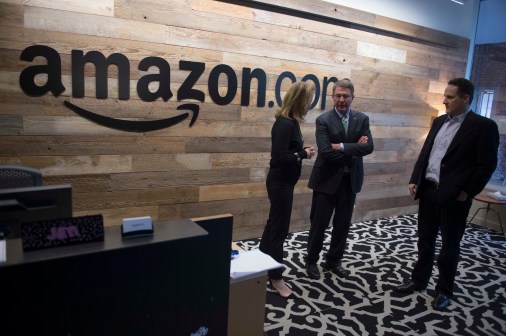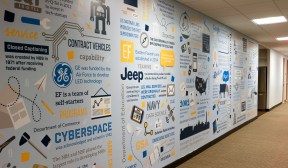2017 saw lots of talk about collaboration between startups and gov. Will 2018 see more action?

For startups, working with the federal government probably didn’t get meaningfully easier in 2017. But the challenges these young companies face, and the ways in which the government can benefit from their tech and expertise, were often front-of-mind this year.
When Eastern Foundry, the local co-working space for small government contractors, released a report on why startups don’t bid on federal contracts, the central reason identified was concise: The government is hard to work with. Despite the size of the federal budget, many startups just don’t think the hassle is worth it.
There’s hope though, the report suggested — the government can adopt a more startup-friendly attitude, and vice-versa.
At NVIDIA’s GPU Technology Conference in November, a mixed panel of startup and government representatives discussed why startups should bother with the federal government at all. “We bring really good problem sets,” Dawn Myerriecks, deputy director for science and technology at the CIA, told the crowd when asked what the government can do for startups.
Startup representatives on the panel concurred and noted cautiously that the government seems to be moving in the right direction.
Specifically, they said, programs like DIUx, In-Q-Tel, the Department of Homeland Security’s Silicon Valley Innovation Program and more really do make the process more manageable. Jeff Finan, vice president of business development at radar vision company Echodyne, told a separate panel in September that the SVIP funding process was “very, very streamlined.”
“I’d really like to see other agencies take a hard look at this,” Finan said at the time.
But government innovation programs aren’t the only way startups get a foot in the door — sometimes an opportunity just appears. This was the case for local D.C. startup Data Society, which is helping the Department of Health and Human Services run the inaugural cohort of its new data science education program.
Eastern Foundry leadership has also noticed the prolific conversation around startups and the federal government too. “We’ve definitely seen more chatter in the industry regarding the meshing of startups and government this year, specifically with the Defense Department,” Eastern Foundry cofounder Andrew Chang told FedScoop. “We do believe that it has a direct correlation with all of the talk coming out of this administration about how we need to ramp up our national security capabilities.”
Another reason, he said, is money. Or rather the lack thereof — startups can be cheaper to work with than traditional contractors. “With all the talk about budget cuts and shrinking budgets all across government, the Feds have no other option but to reach out to startups,” Chang said.
Still there’s room for improvement — specifically by transitioning from talk to action. “What we would like to see in 2018 is more action. More rapid acquisitions, more free and open industry days, and more information dissemination for these startups to learn about the opportunities out there.”
While it is difficult to predict what the future holds, it is possible that startups have a real opportunity in government under President Trump. The White House’s Office of American Innovation has maintained that one of its primary goals is to convene the private sector with the government and encourage collaboration between the two. To the extent that innovative companies can help the administration improve government services and save taxpayer money, OAI has painted itself as an ally.
“If we can bring the best thinking from the private sector and put that on top of the best thinking from inside the government in a coordinated fashion then we have a real chance of making a difference,” OAI’s Chris Liddell told the crowd at FedScoop’s FedTalks in June.






